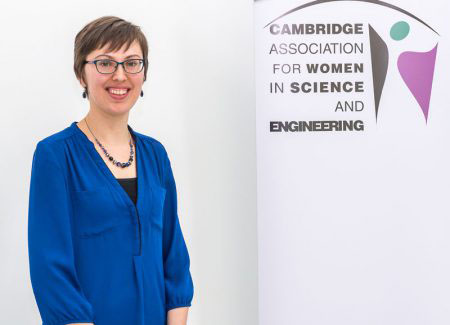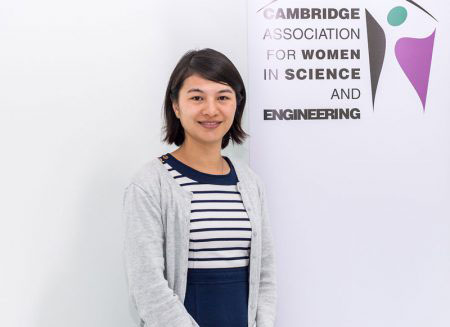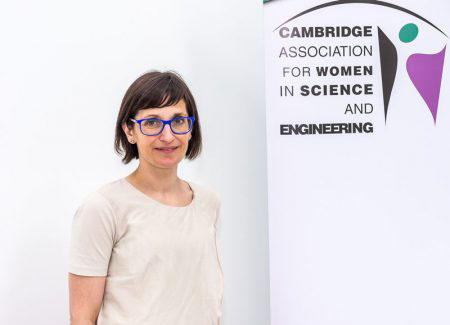An audience of LMB staff and visitors from across Cambridge gathered in the LMB’s Max Perutz Lecture Theatre for the annual “What Next For Your Career In Science?” event. In its twelfth year of existence, the event, which is a collaboration between the LMB and the Cambridge Association for Women in Science and Engineering (AWiSE) aims to showcase the diverse range of careers available to those trained in science.
The three speakers – Amanda Price, Yanlan Mao and Tanita Casci – all LMB alumni with PhDs in the life sciences have gone on to be successful in diverse areas. Each speaker gave a potted summary of their career, and explored how the technical and, often more importantly, the transferable skills which they developed during their scientific training formed the basis for their subsequent career trajectory. Throughout their post-PhD journeys, all three speakers gave consideration to the ways that they liked working and the tasks that they found fulfilling – crucial to securing a rewarding and satisfying job or role.

Amanda completed her PhD in Leo James’ group in the LMB’s PNAC Division from 2007-2011 and stayed to continue her research into HIV structural biology as a postdoc, having been awarded a Research Fellowship from Emmanuel College. The Fellowship opened doors to an academic lifestyle, such as admission and supervision of undergraduate students, however Amanda found that she preferred the practical, bench-work aspects of her job, gradually leading her to realise that a career trajectory towards Group Leader was not the route for her. Amanda then decided to move into industry and joined Astex Pharmaceuticals in 2015, where she is now a Senior Research Associate. Amanda advised the audience to carefully think about they want from a job, as she did, when considering making a move from one sector to another. In addition, finding out what roles and opportunities are available beyond your immediate circle of acquaintances is important. And if you see a job that you think you would like but you don’t think you tick all the boxes – apply anyway!

Yanlan Mao completed her PhD in Matthew Freeman’s group in the LMB’s Cell Biology Division from 2004-2008. She enjoyed the freedom and creativity of research but realised that she wanted more quantitative aspects to her work. Yanlan identified a number of labs for postdoctoral research and applied speculatively with her proposed research project, securing a position at the CRUK London Research Institute. For postdocs with an ambition to continue in academia, Yanlan advised applying for fellowships, helping to hone your project and lending autonomy. In addition, she stressed the importance of building a network of collaborators and having a Group Leader who will support you to independence. In 2013 Yanlan started her own research group at UCL’s MRC Laboratory for Molecular Cell Biology. She noted that carefully building her team has been crucial to the stable start to her group. In 2015 Yanlan had her first child, and whilst balancing work and childcare has been the most challenging part of her scientific career to date, Yanlan was positive that simultaneously being a scientist and a parent is achievable.

Tanita Casci completed her PhD in Matthew Freeman’s group in the LMB’s Cell Biology Division from 1996-1999. She loved the PhD however her favourite aspect was communications. Fortuitously after her PhD an opportunity arose to switch to academic publishing, and in 2000 Tanita joined a small editorial team in London that launched Nature Reviews Genetics. Tanita spent twelve years as commissioning editor of the journal, which involved extensive travelling and networking, and she hugely enjoyed the high pressure but collaborative and professional environment. In 2012 Tanita switched tracks and led the establishment of a big-data research facility at the University of Glasgow. Then in 2014, Tanita joined the Research Strategy and Innovation Office at the University, where she is now Head of Research Policy, overseeing research policies and strategies across all disciplinary areas. At each of her career transitions Tanita brought transferable skills into her new role, and she advised attendees applying for jobs not to think about what they have done, but about the skills they have developed. She emphasised that jobs outside academic can be hugely creative and afford plenty of freedom too.
Following the talks, attendees were able to ask questions and there was a networking lunch where attendees could chat to the speakers, learn more about their fascinating and varied career paths, as well as talk to others in Cambridge about their own career plans.
Established in 1994, Cambridge AWiSE is a regional network for women in science, technology, engineering, and maths (STEM) in both industry and academia and for women who wish to return to a STEM career after a break. The organisation’s aim is to bring together women with common interests to act as a source of support, information, and inspiration. Cambridge AWiSE aims to help women stay in STEM and make the most of their careers, and provides regular talks, workshops, networking opportunities and information.